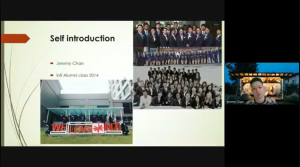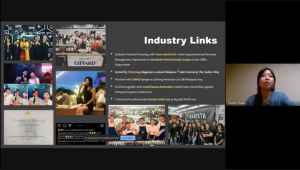It was an insightful afternoon when INTI International College Subang School of Hospitality (SOHOS) alumni Jeremy Chan and Anne Chow came together to share their thoughts and experiences on the career journey they embarked on some years ago.
“The hospitality industry is known for its vital role as a significant catalyst of global economic growth in driving socio-economic development and job creation. Being the third largest component of the services sector, the tourism industry contributes 6% to Malaysia’s GDP and 23% of national employment or 3.5 million jobs[1]. Tourism activities generate multiplier effects towards the ecosystem of hotel businesses, tourist projects, retail businesses, restaurants and transportation services,” shared Tan Kean Buan (Chef Eddie), Interim Dean of SOHOS at the ‘Chit Chat with SOHOS Alumni’ session held exclusively for members and students of the faculty.

The ‘Chit Chat with SOHOS Alumni’ session saw alumni from INTI International College Subang’s School of Hospitality (SOHOS) share their experience in the hospitality industry with students.
He further added, “As we transition into the new, post-pandemic normal, it’s safe to say that hospitality will never be the same. But with disruption comes opportunity, and the path forward while different than it was, this disruption will lead to new beginnings for the hospitality industry, and a future powered by technology and innovation.”
Meanwhile, Jeremy Chan, an alumnus who graduated from Bachelor in Hotel Management programme in 2014, said a decline in demand will test those in the industry.
“As an industry with high financial and operating leverage, the downwards demand has thus tested the resilience of hoteliers who must engage in creative revenue channels to stay afloat. A number of solutions were laid on the table; one of them were hotels working with the government to convert themselves into quarantine centers whilst others have ventured into food catering as a stable source of revenue – with all festivals now being celebrated at home.”

Jeremy Chan, an alumna who graduated from the Bachelor in Hotel Management programme in 2014, highlighted that hotels were working with the government to convert themselves into quarantine centres while others have ventured into food catering as a stable source of revenue.
“Whilst large conventions and meetings are still at least a year away, many city hotels have also offered work-from-hotel packages, utilizing empty conference rooms as co-working spaces. Not only does the current down-period present itself as an opportunity for owners to renovate or refurbish their hotels, it also allows managers to work on activities that are usually pushed forward such as security plans, social media presence or corporate social responsibility,” elaborated Jeremy who is an experienced Front Officer Associate at the Banyan Tree Hotels & Resorts.
In line with that, Jeremy pointed out an example describing that the rise of eco-tourism has increased hotel interest in achieving the numerous environmental, social and governance permits to gain green accreditation for consumers who want to see hotel compliance with environmental sustainability.
SOHOS alumna Anne Chow, who went from a hotelier to a digital marketer, shared her thoughts about the role of marketing in the hospitality industry.

Anne Chow, a Master of Business Adminstration (MBA) in International Marketing in collaboration with Coventry University graduate, perceives digital marketing to be fruitful for the hospitality business especially in the new normal.
“Like many other industries, hospitality will also see substantial shifts as businesses and people in their everyday lives get acclimated to this new reality. Changes to business operations need to be constant and dynamic to enhance customer willingness to patronize their hotels,” said Anne who also graduated from the Master of Business Adminstration (MBA) in International Marketing programme in collaboration with Coventry University, and is currently working for an IT company in Malaysia that is headquartered in Hong Kong.
“While hotel closures are expected to ease, there is no denying that the hotel industry has been badly impacted by the pandemic, raising the issue of the massive drain in talent, manpower and the larger question of how the industry will recover. It is a known fact that it will be quite challenging to hire new employees and the time taken to train these new hires will be difficult at this juncture,” she added.
According to Anne, digital marketing can be very useful for a hotel business. It can help the hotel, whether small or big, to recapture lost revenue as well as generate more revenue. In this competitive age, it is important to stay ahead of the competitors and also keep the marketing strategies up to date to survive the competitive niche.
“Not attempting to adopt new trends in the market can lead you to fall behind. When you are in the hotel business, whether in a chain of hotels or own a single hotel, knowing the current marketing trends will massively benefit your business. The main reason why digital marketing would be extremely beneficial is that most of the customers are tech-savvy these days. They come to know about the brand via the internet. And so, you too can use the internet for the benefit of your hotel business.
“We all know that the hospitality industry particularly is known to be difficult to succeed in. Additionally, attaining better marketing strategies for a business is also not an easy task. This makes marketing for hotels a bit complex and difficult. Nonetheless, digital marketing has always been proved to be beneficial for other industries so far. And it certainly will be fruitful for the hotel and hospitality business as well,” Anne highlighted.
[1] https://www.dosm.gov.my/v1/index.php?r=column/cthemeByCat&cat=111&bul_id=Wk1KWlpxZTRDWnVhVWNMV21ZVVY3Zz09&menu_id=TE5CRUZCblh4ZTZMODZIbmk2aWRRQT09